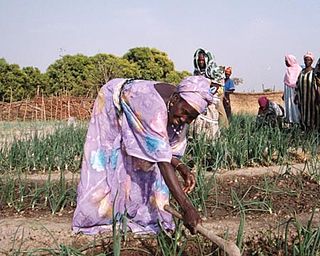Related Research Articles

A cooperative is "an autonomous association of persons united voluntarily to meet their common economic, social and cultural needs and aspirations through a jointly owned and democratically-controlled enterprise". Cooperatives are democratically controlled by their members, with each member having one vote in electing the board of directors. They differ from collectives in that they are generally built from the bottom-up, rather than the top-down. Cooperatives may include:
The Agricultural Wheel was a cooperative alliance of farmers in the United States. It was established in 1882 in Arkansas. A major founding organizers of the Agricultural Wheel was W. W. Tedford, an Arkansas farmer and school teacher. Like similar farmer organizations such as the Southern Farmers' Alliance, the Louisiana Farmers' Union, and the Brothers of Freedom, the Agricultural Wheel had been formed to expose and correct the injustices and oppressions done to the small farmers by merchants, grain elevators and the railroads. The Wheel promoted a radical agenda including currency expansion through free silver; closing all national banks; regulation or nationalization of the railroads, the telephones and the telegraph; allow only Americans to purchase public lands; impose an income tax on high incomes; and elect senators by popular election instead of by state legislatures. The Wheel encouraged farmers to join local cooperatives, avoid the debt cycle, and avoid one crop overemphasis on cotton.
A mutual organization, also mutual society or simply mutual, is an organization based on the principle of mutuality and governed by private law. Unlike a cooperative, members usually do not directly contribute to the capital of the organization, but derive their right to profits and votes through their customer relationship.

The Farmers' Alliance was an organized agrarian economic movement among American farmers that developed and flourished ca. 1875. The movement included several parallel but independent political organizations — the National Farmers' Alliance and Industrial Union among the white farmers of the South, the National Farmers' Alliance among the white and black farmers of the Midwest and High Plains, where the Granger movement had been strong, and the Colored Farmers' National Alliance and Cooperative Union, consisting of the African American farmers of the South.

A benefit society, fraternal benefit society, fraternal benefit order, friendly society, or mutual aid organization is a voluntary association formed to provide mutual aid, benefit, for instance insurance for relief from sundry difficulties. Such organizations may be formally organized with charters and established customs or may arise ad hoc to meet the unique needs of a particular time and place.
The farmers' movement was, in American political history, the general name for a movement between 1867 and 1896. In this movement, there were three periods, popularly known as the Grange, Alliance and Populist movements.
The social economy is formed by a rich diversity of enterprises and organisations, such as cooperatives, mutuals, associations, foundations, social enterprises and paritarian institutions, sharing common values and features:

CHS Inc. is a Fortune 500 secondary cooperative owned by United States agricultural cooperatives, farmers, ranchers, and thousands of preferred stock holders. Based in Inver Grove Heights, Minnesota, CHS owns and operates various food processing and wholesale, farm supply, financial services and retail businesses. It also distributes Cenex brand fuel in 19 midwestern and western states as one of North America's largest c-store networks. It is a co-owner of Ventura Foods, a vegetable oil processor.

An agricultural cooperative, also known as a farmers' co-op, is a producer cooperative in which farmers pool their resources in certain areas of activities.
A mutual insurance company is an insurance company owned entirely by its policyholders. It is a form of consumers' co-operative. Any profits earned by a mutual insurance company are either retained within the company or rebated to policyholders in the form of dividend distributions or reduced future premiums. In contrast, a stock insurance company is owned by investors who have purchased company stock; any profits generated by a stock insurance company are distributed to the investors without necessarily benefiting the policyholders.
A nonprofit corporation is any legal entity which has been incorporated under the law of its jurisdiction for purposes other than making profits for its owners or shareholders. Depending on the laws of the jurisdiction, a nonprofit corporation may seek official recognition as such, and may be taxed differently from for-profit corporations, and treated differently in other ways.
The Ocala Demands was a platform for economic and political reform that was later adopted by the People's Party. In December, 1890, the National Farmers' Alliance and Industrial Union, more commonly known as the Southern Farmers' Alliance, its affiliate the Colored Farmers' Alliance, and the Farmers' Mutual Benefit Association met jointly in the Marion Opera House in Ocala, Florida, where they adopted the Ocala Demands.

Cooperative banking is retail and commercial banking organized on a cooperative basis. Cooperative banking institutions take deposits and lend money in most parts of the world.

Cooperativeeconomics is a field of economics that incorporates cooperative studies and political economy toward the study and management of cooperatives.

George Jacob "G.J." Mecherle was the founder of State Farm, headquartered in Bloomington, Illinois. Mecherle, a farmer who later became an insurance agent, founded State Farm after becoming dissatisfied with the insurance rates charged to farmers, as those rates included the risks of city drivers as well.
The history of cooperatives in the United States extends to pre-independence times. With the exception of credit unions and mutual banking institutions, most cooperatives have held a light footprint on the economic history of the United States, compared to the economies of Europe.
Fred G. Blood was a Populist member of the Illinois House of Representatives.

Cicero Jefferson Lindly (1857–1926) was an American politician and judge who served as a Republican member of the Illinois House of Representatives.
References
- Blackmar, Frank W. (1912). "Farmers' Mutual Benefit Association". Kansas: a cyclopedia of state history, embracing events, institutions, industries, counties, cities, towns, prominent persons, etc. Vol. I. Chicago: Standard Publishing Co. p. 632. Archived from the original on June 12, 2013. Retrieved 22 August 2014.